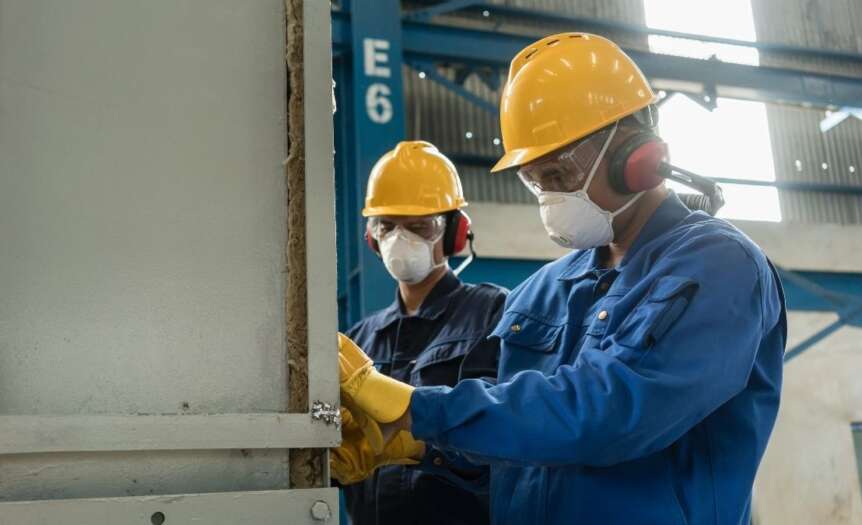If you are new to an industrial job, you will want to make sure you know the basic guidelines for working there if you don’t want to get fired in your first few weeks. When you mess up, you put your and other people’s lives on the line, so there is little room for error. Even though you most likely learned all of these rules in training, it won’t hurt to go over the most important rules to follow while doing industrial work.
Make Sure Everything Is Labeled Correctly and Put Away
When working in a factory or other industrial job, you’ll quickly notice that many objects look the same. The longer you’re there, the better you’ll get at identifying them, but that doesn’t mean the new people will be, so you have to make sure everything is labeled correctly. If not, someone might reach into something they shouldn’t have and get injured.
Once it’s labeled correctly, you need to put it back where it belongs. For example, if you leave a vat of chemicals sitting out, someone might trip over it and spill them all over themselves or someone else. This can have disastrous results, so you need to put things away when you finish up with them. Plus, that’ll make it easier for the next person to find them.
Always Wear the Correct PPE for the Job at Hand
Your employer will either give you or tell you what Personal Protection Equipment (PPE) you’ll need for the job, but it’s your responsibility to wear it every day. In many industrial positions, fire-resistant clothing is a must. There are many repercussions you’ll have to deal with if you don’t wear it and catch on fire. You should be fine while working as long as you wear the equipment you’re supposed to wear.
Ensure That You Have the Right Tools for the Job
In the same way that you need the right PPE for the job, you also need the right tools. That’s why this important rule to follow while doing industrial work is a vital one. Bringing the wrong tools or forgetting ones you’ll need can lead to you breaking the machine you’re fixing. That’s the best-case scenario, though. In the worst case, someone can get badly injured or killed due to your mistake.
Deal With Potential Hazards Right Away
If you ever notice something’s about to go wrong, act upon it immediately, even if it’s not a part of your station. If your employer finds out that you could have done something to prevent a disaster, that will not go over well for you. When you see a hazard, inform those in danger, turn the source of the problem off if you can, then inform a higher-up about what’s happening. As long as you follow these steps, you’ve done everything that one can expect from you.










 Deering Estate
Deering Estate
 Massage Envy South Miami
Massage Envy South Miami
 Calla Blow Dry
Calla Blow Dry
 My Derma Clinic
My Derma Clinic
 Sushi Maki
Sushi Maki
 Sports Grill
Sports Grill
 The Healthy Kitchen
The Healthy Kitchen
 Golden Rule Seafood
Golden Rule Seafood
 Malanga Cuban Café
Malanga Cuban Café

 Kathleen Ballard
Kathleen Ballard
 Panter, Panter & Sampedro
Panter, Panter & Sampedro
 Vintage Liquors
Vintage Liquors
 The Dog from Ipanema
The Dog from Ipanema
 Rubinstein Family Chiropractic
Rubinstein Family Chiropractic
 Your Pet’s Best
Your Pet’s Best
 Indigo Republic
Indigo Republic




 ATR Luxury Homes
ATR Luxury Homes


 2112 Design Studio
2112 Design Studio
 Hamilton Fox & Company
Hamilton Fox & Company
 Creative Design Services
Creative Design Services
 Best Pest Professionals
Best Pest Professionals
 HD Tree Services
HD Tree Services
 Trinity Air Conditioning Company
Trinity Air Conditioning Company
 Cisca Construction & Development
Cisca Construction & Development
 Mosquito Joe
Mosquito Joe
 Cutler Bay Solar Solutions
Cutler Bay Solar Solutions


 Miami Royal Ballet & Dance
Miami Royal Ballet & Dance
 Christopher Columbus
Christopher Columbus
 Pineview Preschools
Pineview Preschools
 Westminster
Westminster
 Carrollton
Carrollton
 Lil’ Jungle
Lil’ Jungle
 Frost Science Museum
Frost Science Museum
 Palmer Trinity School
Palmer Trinity School
 South Florida Music
South Florida Music
 Pinecrest Orthodontics
Pinecrest Orthodontics
 Dr. Bob Pediatric Dentist
Dr. Bob Pediatric Dentist
 d.pediatrics
d.pediatrics
 South Miami Women’s Health
South Miami Women’s Health

 The Spot Barbershop
The Spot Barbershop
 My Derma Clinic
My Derma Clinic




 Miami Dance Project
Miami Dance Project

 Rubinstein Family Chiropractic
Rubinstein Family Chiropractic
 Indigo Republic
Indigo Republic

 Safes Universe
Safes Universe
 Vintage Liquors
Vintage Liquors
 Evenings Delight
Evenings Delight





 Atchana’s Homegrown Thai
Atchana’s Homegrown Thai
 Baptist Health South Florida
Baptist Health South Florida

 Laser Eye Center of Miami
Laser Eye Center of Miami
 Visiting Angels
Visiting Angels
 OpusCare of South Florida
OpusCare of South Florida

 Your Pet’s Best
Your Pet’s Best





 HD Tree Services
HD Tree Services
 Hamilton Fox & Company
Hamilton Fox & Company


 Creative Design Services
Creative Design Services